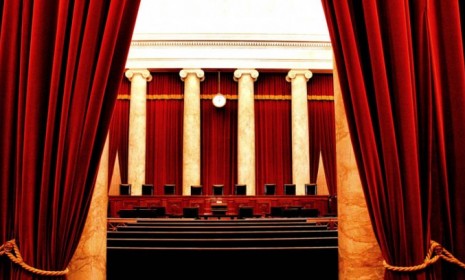Should the Supreme Court's 'ObamaCare' arguments be televised?
C-SPAN wants the court to break precedent and let Americans see 2012's historic court drama for themselves. Will the justices object?

A free daily email with the biggest news stories of the day – and the best features from TheWeek.com
You are now subscribed
Your newsletter sign-up was successful
The Supreme Court has long resisted efforts to televise its proceedings, with Justice David Souter declaring in 1996 that if TV cameras ever enter the courtroom, they'll "roll over my dead body." Well, Souter has retired, and the Supreme Court's decision to rule next year on the fate of the Affordable Care Act — a.k.a. "ObamaCare" — has renewed calls for televised arguments. On Tuesday, C-SPAN chief Brian Lamb made a formal request, arguing that the justices should let cameras in because this case affects "every American's life, our economy, and certainly will be an issue in the upcoming presidential campaign." Sen. Chuck Grassley (R-Iowa) and House Minority Leader Nancy Pelosi (D-Calif.) echoed C-SPAN's request. Are the 5 1/2 hours of "ObamaCare" hearings the right time to debut SCOTUS TV?
Televising the hearings is a no-brainer: This change is long overdue, says former Sen. Arlen Specter (R D-Pa.) in The Philadelphia Inquirer. Other branches of government routinely broadcast their deliberations. "Televised congressional hearings, especially on Supreme Court nominations, have already drawn extensive audiences" and helped educate the nation. Plus, the Supreme Court itself has recognized in the past "that the Constitution guarantees judicial proceedings that are open to the media as well as the public." If the justices won't let the cameras roll, Congress should force their hands.
"TV could boost Supreme Court's ratings"
The Week
Escape your echo chamber. Get the facts behind the news, plus analysis from multiple perspectives.

Sign up for The Week's Free Newsletters
From our morning news briefing to a weekly Good News Newsletter, get the best of The Week delivered directly to your inbox.
From our morning news briefing to a weekly Good News Newsletter, get the best of The Week delivered directly to your inbox.
This transparency is years too late: Transparency would have been far more beneficial "back when all Americans should have had a stake in the debate," says Doug Powers at Michelle Malkin's blog, when "ObamaCare" was being written behind closed doors, and Nancy Pelosi had the attitude that "you have to pass it to find out what's in it." Now, sadly, "the opinion of anybody who isn't wearing a SCOTUS robe" doesn't really matter.
"Nancy Pelosi: The ObamaCare SCOTUS arguments should be transparent…"
The cameras could actually help the justices: There are lots of legal reasons to bring in the cameras, and "the arguments against them have largely dwindled away," says Emily Badger at Miller-McCune. Still, the "most compelling argument... may be that the court itself could benefit from cameras." If the ACA ruling splits the court 5-4, the justices have every reason to share their deliberations with the nation, so Americans can rest assured that this is a legal dispute, not a political one.
"Making a case for televising the Supreme Court"
A free daily email with the biggest news stories of the day – and the best features from TheWeek.com
-
 The environmental cost of GLP-1s
The environmental cost of GLP-1sThe explainer Producing the drugs is a dirty process
-
 Greenland’s capital becomes ground zero for the country’s diplomatic straits
Greenland’s capital becomes ground zero for the country’s diplomatic straitsIN THE SPOTLIGHT A flurry of new consular activity in Nuuk shows how important Greenland has become to Europeans’ anxiety about American imperialism
-
 ‘This is something that happens all too often’
‘This is something that happens all too often’Instant Opinion Opinion, comment and editorials of the day
-
 The billionaires’ wealth tax: a catastrophe for California?
The billionaires’ wealth tax: a catastrophe for California?Talking Point Peter Thiel and Larry Page preparing to change state residency
-
 Bari Weiss’ ‘60 Minutes’ scandal is about more than one report
Bari Weiss’ ‘60 Minutes’ scandal is about more than one reportIN THE SPOTLIGHT By blocking an approved segment on a controversial prison holding US deportees in El Salvador, the editor-in-chief of CBS News has become the main story
-
 Has Zohran Mamdani shown the Democrats how to win again?
Has Zohran Mamdani shown the Democrats how to win again?Today’s Big Question New York City mayoral election touted as victory for left-wing populists but moderate centrist wins elsewhere present more complex path for Democratic Party
-
 Millions turn out for anti-Trump ‘No Kings’ rallies
Millions turn out for anti-Trump ‘No Kings’ ralliesSpeed Read An estimated 7 million people participated, 2 million more than at the first ‘No Kings’ protest in June
-
 Ghislaine Maxwell: angling for a Trump pardon
Ghislaine Maxwell: angling for a Trump pardonTalking Point Convicted sex trafficker's testimony could shed new light on president's links to Jeffrey Epstein
-
 The last words and final moments of 40 presidents
The last words and final moments of 40 presidentsThe Explainer Some are eloquent quotes worthy of the holders of the highest office in the nation, and others... aren't
-
 The JFK files: the truth at last?
The JFK files: the truth at last?In The Spotlight More than 64,000 previously classified documents relating the 1963 assassination of John F. Kennedy have been released by the Trump administration
-
 'Seriously, not literally': how should the world take Donald Trump?
'Seriously, not literally': how should the world take Donald Trump?Today's big question White House rhetoric and reality look likely to become increasingly blurred